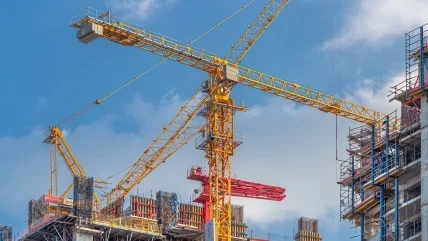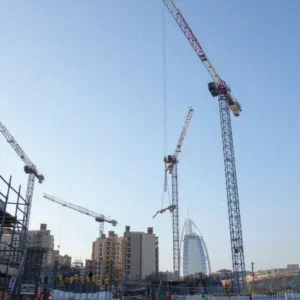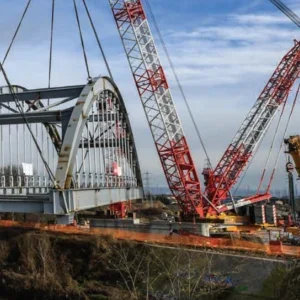
A digital disruptor is a company or individual that uses technology to create new business models or transform existing industries, often by challenging established businesses and their traditional methods. Digital disruptors leverage technology and innovation to create new products or services, change the way things are done, and create new markets or industries.
Examples of digital disruptors include companies like Uber, Airbnb, and Netflix, which have disrupted the traditional taxi, hotel, and entertainment industries, respectively, by using digital technology to offer new services and business models.
Digital disruptors are often characterised by their ability to be agile, innovative, and responsive to changing customer needs and preferences, which can give them a competitive advantage over established businesses.
In recent years, digital disrupters have made a significant impact on the construction industry. Innovative technologies are transforming the way we design, build, and operate buildings, roads, bridges, and other infrastructure projects.
Technologies facilitating change and reshaping the construction industry include Building Information Modelling (BIM), Virtual and Augmented Reality (VR/AR), the Internet of Things (IoT), and Artificial Intelligence (AI).
One self-proclaimed digital disruptor, however, is focussing specifically on the crane procurement process where it claims its digital services can help those looking to rent a crane as well as crane suppliers by increasing both efficiency and transparency for both parties.
MAKING WAVES
MyCrane launched just two years ago and has already made waves in the lifting industry via its targeted communications and expansion policies.
Its primary offering is a global business-to-business (B2B) platform that allows users to submit details of their lifting requirements in order to receive personalised quotes from a range of registered crane providers.
This has expanded to include other tools for the crane industry, such as a marketplace for equipment and support services encompassing engineering and legal consultancy and an inspections app.
Regions covered by MyCrane’s services have also expanded quickly, at first covering the United Arab Emirates, Oman, Kazakhstan and Uzbekistan and now encompassing more than 20 countries across Europe, Asia, North America and the Middle East. MyCrane says it has over 15,000 cranes available through its procurement service already.
Amongst others, MyCrane has attracted the attention of large companies in the Engineering, Procurement and Construction Management (EPCM) sector – with a slew of high-profile clients signing up to use MyCrane’s services including PESCO Switzerland, and Indian companies Larsen & Toubro (L&T), Tata Projects and IRB Infrastructure.
FOUNDING FATHER
MyCrane’s founder and CEO is Andrei Geikalo. In his thirties, Geikalo has the entrepreneurial energy combined with experience that is key to success for any start-up.
“I studied cranes for six years at a technical university,” Geikalo says. “Then I joined Mammoet, the biggest and coolest company in the crane world. I was lucky to work there for 13 years, working my way up to the position of sales director for the CIS countries. This gave me a great perspective of both sides of the crane procurement process and I could see how much time was being wasted with this process. Solving this problem was the genesis of MyCrane.”
Another key trait Geikalo shares with successful entrepreneurs is his charisma, which has helped him assemble a tight, and growing, team of industry professionals.
To date the MyCrane team includes Houston, USA-based Scott Wilkes as director of business development; Piet Kraaijeveld as chief operating officer; and Erik Altena as head of strategic development.
“MyCrane is made by people from the industry, together with people from the industry,” says Geikalo.
TIME IS MONEY
So why has MyCrane’s offering attracted such attention from across the industry and how exactly does it work?
“Thanks to our system we can offer time savings of around 90 percent compared to traditional methods of procurement,” explains Geikalo. “Traditionally renting a crane can be a very long-winded process – not only sourcing which companies can meet your needs but then trying to compare all the quotes in differing formats. Once you enter the digital era, however, none of this is necessary as we have automated the whole process.
“Our service starts with one simple premise: the need for a crane. Beyond that we have the tools to make everything automated. We have over 3000 crane charts available on our crane selector tool and our system helps you define which cranes can do particular jobs.
“You just need to know the basic lift data parameters, such as the load weight, the lifting height and the radius; the program then helps define which crane or cranes are needed. This gives users a completely impartial perspective on their crane options.”
Users input information by simply clicking boxes which provides suppliers with all the information they need to provide a quote. Special requirements for a lift are also catered for. These can be inputted and then accounted for by the crane suppliers.
“On the supplier side, registered crane suppliers just need to add their crane fleet. We verify everything thoroughly so that users know that the supplier really does have the crane they are quoting for and we can ensure that inquiries only go to the companies that have the right cranes for the job in their fleet.
“This saves an incredible amount of time as it simplifies the process, eliminating the 'back and forth' of traditional crane procurement whilst also providing metrics of responsibility i.e who is responsible for what, as it is all covered by our system.
“In this way I believe we are making the market transparent, as clients receive easily comparable quotes and, if interested, they can go to our public page and see the company's full fleet, its track record and rating.”
POWERED BY PASSION
The benefits of efficiency and transparency provided by the technology are clear. What become clear on meeting Geikalo is that underpinning this technology is real human passion.
“It all starts with our love for cranes,” Geikalo says. “All our team are passionate about the lifting industry and it is our aim to help improve, support and develop it.”
So what’s next for MyCrane? A primary objective is to continue growing its supplier and user base and further developing its worldwide network. Like all big digital disruptors the company is also looking at developing an app to complement its website, with the aim of making its services even more accessible.
In conclusion, digital disrupters are transforming the construction industry by increasing efficiency, reducing costs, and improving transparency. It is essential for construction companies, rental firms and crane users to embrace these technologies to remain competitive and meet the demands of the ever-changing construction landscape.
Talking plans! ChatGpT in construction
Artificial Intelligence is a fast-growing digital disruptor technology which is now being used in the construction industry.
According to Miami, Florida, USA-based start-up Togal.AI, for the first time ever people in construction can talk to their plans and their plans will talk back to them! This is possible, it says, thanks to artificial intelligence and ChatGPT via its OpenAI ChatGPT service.
The service is designed to enhance document management — so construction professionals can use semantic search functionality to find relevant information across thousands of pages of plans, contracts, specifi cation books, schedules and budgets in seconds.
“We see great potential for ChatGPT in the construction industry and we’re proud to be one of the first to use it,” commented Patrick Murphy Togal.AI founder and CEO. “It is incredible to see our teams literally talk to their plans and have their plans respond back with answers instantly.
“With hundreds of pages in construction plans, ChatGPT will help Togal.AI users save time, improve accuracy and serve as a powerful tool to eliminate mundane tasks, so estimators can focus on higher value jobs.”






